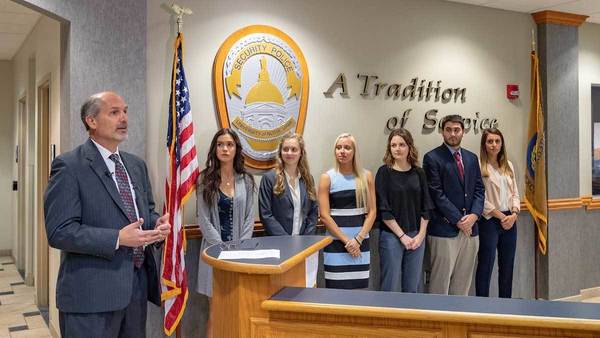
St. Joseph County Prosecuting Attorney Kenneth P. Cotter conducted a swearing-in ceremony Friday (Sept. 7) at the new location of his Cyber Crimes Unit at the University of Notre Dame. The unit recently relocated to Hammes Mowbray Hall, home of the Notre Dame Security Police department, to provide the county with expanded working space and greater access to a larger group of University student interns.
Previously, the internship program operated from the county jail with three Notre Dame student interns. On Friday, Cotter swore in six undergraduates who were chosen in a competitive applicant process to work as interns with the unit.
Cotter said: “The student interns are a great asset to the Cyber Crimes Unit and to our community. The expansion of the internship program allows us to keep building on the great forensic work being done by the students in our criminal investigations.”
Mike Seamon, Notre Dame’s vice president for campus safety and event management, said that relocating the unit to campus enhances the partnership between the University and the community.
“Housing the Cyber Crimes Unit in Hammes Mowbray Hall, adjacent to Notre Dame Security Police offices, provided the University a unique opportunity to support the critical work of this important investigative unit,” he said. “Couple that with the invaluable opportunity for our students to work alongside our talented local law enforcement partners and gain practical real-world experience. We are proud of our students and the partnership we share with local law enforcement.”
This is the third year that Notre Dame students have worked as interns in the county’s Cyber Crimes Unit. While a handful of other universities around the country, such as the University of Alabama and the University of Rhode Island, are involved in similar hybrid digital forensic investigative unit models, Notre Dame’s is the only program in which the students are sworn officers.
Mitch Kajzer, St. Joseph County cyber crimes director, said the unit values the insight and knowledge that the Notre Dame students bring to investigations. By swearing them in as officers, the students are able to assist in writing and executing search warrants, analyze evidence and testify in cases in which they have been involved.
Noting the so-called “digital divide” between generations, Kajzer said: “The students understand technology differently and better, in some cases, than traditional law enforcement officers. The fact that technology is engrained in their daily lives gives them a proficiency level that most officers do not have. They look at things differently and help us find evidence that we may not see or even know exists.”
Kajzer noted that with the proliferation of technology, nearly every crime today contains digital or technological elements including mobile phones, drones, portable drives, laptops, digital tracking devices and more. He explained that the interns assist with multiple types of criminal cases involving homicides, domestic violence, drug violations and others.
The Notre Dame students who were chosen this year are sophomores, juniors and seniors studying in a variety disciplines, from computer science to economics; political science; film, television and theater; and information technology management. They are Sam Alptekin (Darien, Connecticut), Christina Casino (Stamford, Connecticut), Julia Gately (Lake Forest, Illinois), Carolyn Kammeyer (Gulf Breeze, Florida), Brooke Sabey (Seattle, Washington) and Lexie Van Den Heuvel (Mequon, Wisconsin). As sworn-in officers, they will carry a badge (but no weapons) when working in the field and have full police authority.
The interns work eight to 12 hours per week for the unit. When not working on active cases, the students are engaged in a variety of digital forensic research assignments for the department, including projects involving smart speakers, fitness trackers, wearable devices and the tracking capabilities of mobile devices and their embedded applications.
Mike Chapple, academic director of Notre Dame’s Master of Science in Business Analytics program and associate teaching professor of IT, Analytics and Operations, teaches undergraduate and graduate courses in business analytics and cybersecurity, and serves as faculty adviser to the Cyber Crimes Unit interns.
According to a recent national study from the University of Alabama, hybrid models combining municipal officers with college students prove to be beneficial for all those involved.
“Law enforcement agencies across the country are struggling to keep pace with processing and analyzing digital evidence seized in active criminal cases,” the study noted. “These (hybrid) organizations do more than ‘look and act’ like a digital forensic task force — they combine resources of experts from separate institutions, tap into the knowledge of student-based digital natives and offer an enhanced opportunity to serve their communities. (These) task forces reported that the benefits related to the integration of academia with law enforcement agencies enhanced their capabilities to better serve their communities and provide a greater benefit to society.”
Originally published by at news.nd.edu on September 07, 2018.